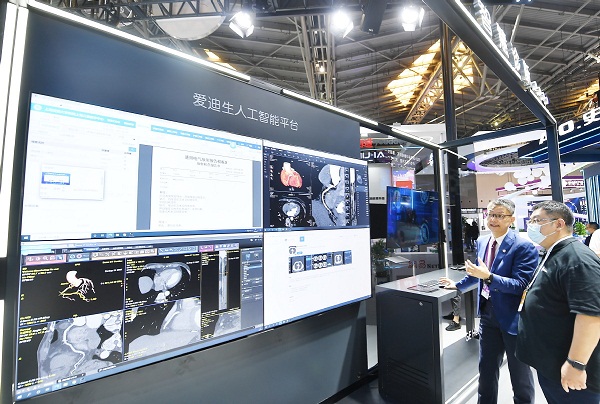Application of cutting-edge tech on show in Shanghai

An employee (left) answers visitor queries on a smart diagnose system during a warm-up event of the World Artificial Intelligence Conference 2021 in Shanghai on Wednesday. [Photo by SUN ZHONGQIN/FOR CHINA DAILY]
WAIC 2021 reveals metropolis' efforts toward goal of a major global AI center
From autonomous driving cars, unmanned convenience stores to a brain-computer interface which can help treat diseases, Shanghai is making artificial intelligence technologies and their applications more ubiquitous, and accelerating steps toward its goal of building itself into a national AI center with global influence.
With the kickoff of the World Artificial Intelligence Conference 2021, the metropolis has vowed to see the sector enjoy 15 percent compound annual growth so it can hit 400 billion yuan ($61.8 billion) in value by 2025.
Such a goal is in line with the city's digitalization drive during the 14th Five-Year Plan (2021-25). It should come about through technological breakthroughs, investments, public platform construction and policy innovation, said the Shanghai Municipal Commission of Economy and Informatization, the city's industrial regulator.
The WAIC 2021 symbolizes Shanghai's efforts on the AI front. The meeting from July 8 to 10 will see some 1,000 industry luminaries attend, including Turing Awardees Joseph Sifakis and Andrew Chi-Chih Yao, along with academicians and top business executives.
A dazzling array of AI-backed applications are being showcased during the event. For instance, at Shanghai's River Mall, people can stand to experience virtual mirrors at apparel shops where algorithms can give recommendation to customers on their best outfit without hassles of inadequate fitting rooms.
Visitors can also enjoy coffee prepared by robots, and grab a pack of chips at an unstaffed convenience store where the bill is automatically deducted through their phones when they leave.
Autonomous driving buses run test trials in select areas near the exhibition venue. Some of the bus-es run at around Level 4 or high autonomous driving. AI firm SenseTime provides the bus fleet coupled with augmented reality technology to give guests an immersive ride.
"Equipped with SenseAuto Pilot solutions, the buses follow a designated route and are most suitable to shuttle between work campuses and tourist sites," said Shi Jianping, vice-president of Intelligent Driving of SenseTime's Mobile Intelligence Group. "AR technologies also enable customers to view everything from graphics to videos from inside the vehicle."
 Contact Us
Contact Us

 Brilliant light show to illuminate Huangpu River
Brilliant light show to illuminate Huangpu River Maple leaves paint splendid scenery in Pudong
Maple leaves paint splendid scenery in Pudong Appreciate alluring lotus blossoms in Pudong's Century Park
Appreciate alluring lotus blossoms in Pudong's Century Park New pedestrian street boosts Pudong's night economy
New pedestrian street boosts Pudong's night economy 


